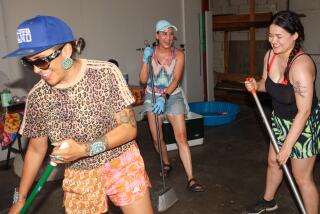Tongva Indians Celebrate Roots Rediscovered
- Share via
A ring of logs in a grassy clearing below Old Boney Mountain was the center of the universe on Sunday.
The circle, on a hill above the Satwiwa Native American Indian Culture Center in the Santa Monica Mountains National Recreation Area near Newbury Park, was the site of the year’s last public ceremonies by members of the Tongva Indian Nation.
More than 20 members of the Tongva, the “People of the Land” in English, danced as their ancestors once did and explained aspects of their proud oral traditions.
At the start of the ceremony, tribe members brought vessels containing soil from eight points of the compass representing the outer limits of the Tongva universe, which stretched along the coast from Topanga Canyon south to Laguna Beach and as far inland as Castaic and the Cajon Pass.
The Tongva culture now enters a six-month hibernation as does the bear, tribal leaders said, in preparation for the coming spring.
Members of the Tongva nation will spend the winter months perfecting their dances and songs and relearning their language, which had been all but forgotten after their “civilization” by Spanish missionaries.
“So much of the culture was wiped out that we’re still going through the whole business of recovering the language and the songs,” Mark Acuna said.
“Hopefully within a year the paper will be gone and the words will be in the heart, rather than in the head.”
When not clad in his ancestral garb of grass, furs, beads, shells and feathers, Acuna is an English professor at Mt. San Antonio College in Walnut.
The Tongva, known to the Spaniards as Gabrielino Indians because of their presence at the San Gabriel Mission, were the original inhabitants of what is now the Los Angeles Basin and the surrounding mountains.
Although long dismissed as extinct by many historians, Tongva culture and beliefs were merely forced into hiding while members of the nation struggled to adapt to the foreign cultures that sprung up around them.
Like many native peoples, members of the Tongva have since experienced a reawakening and are embracing their long-buried roots.
“Some of the elders kept the traditions going,” Acuna said.
“About a year ago, a group of us began saying, ‘It is the time.’ ”
More to Read
Sign up for Essential California
The most important California stories and recommendations in your inbox every morning.
You may occasionally receive promotional content from the Los Angeles Times.













